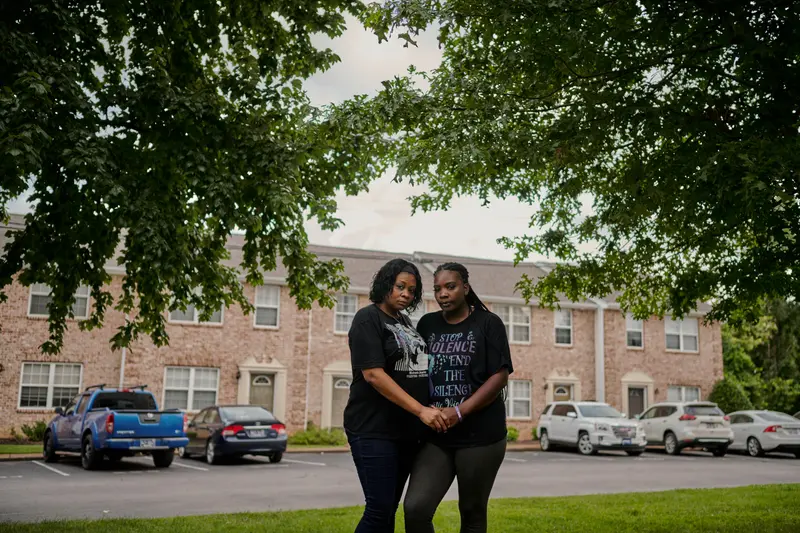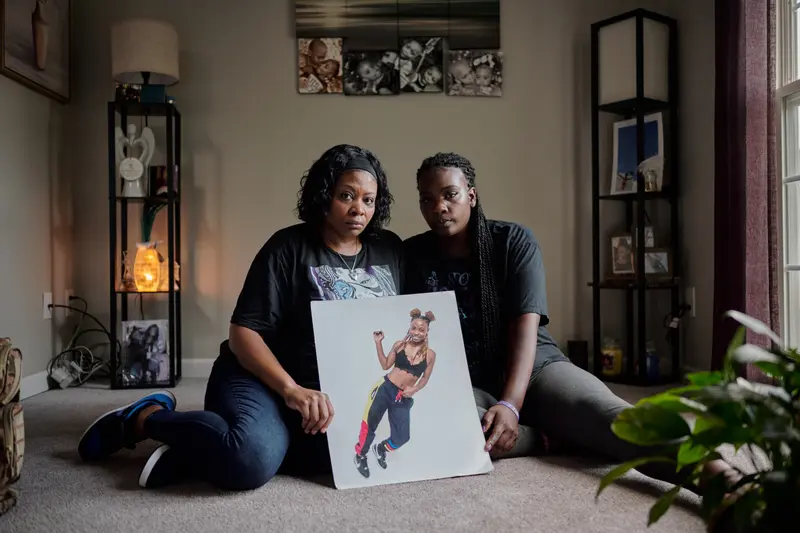This article was produced for ProPublica’s Local Reporting Network in partnership with WPLN/Nashville Public Radio. Sign up for Dispatches to get stories like this one as soon as they are published.
This story contains a description of a 911 call that took place as a homicide was being committed.
Michaela Carter felt like she was being hunted.
She fled her family’s home on Nov. 15, 2021, and called 911 with her mother, pulling into the parking lot of a discount store in southeast Nashville, Tennessee, to await the police.
“Are they sending people?” Carter can be heard asking her mom on the 911 call.
Her mother, Kimberly Jones-Mbuyi, told the dispatcher that Carter’s estranged husband had just been seen walking around a family member’s apartment complex with a gun.
James Leggett had gotten out of jail 10 days earlier. He’d been locked up since Carter reported to police that he’d repeatedly hit her in the face with a bottle of Jack Daniel’s. Since he was released, he’d started calling her and sending increasingly desperate text messages.
The night before, he posted on Facebook: “Somebody with nothing to lose won’t give a fuck when shit gets real.”
Then, that morning: “Today is the day.”
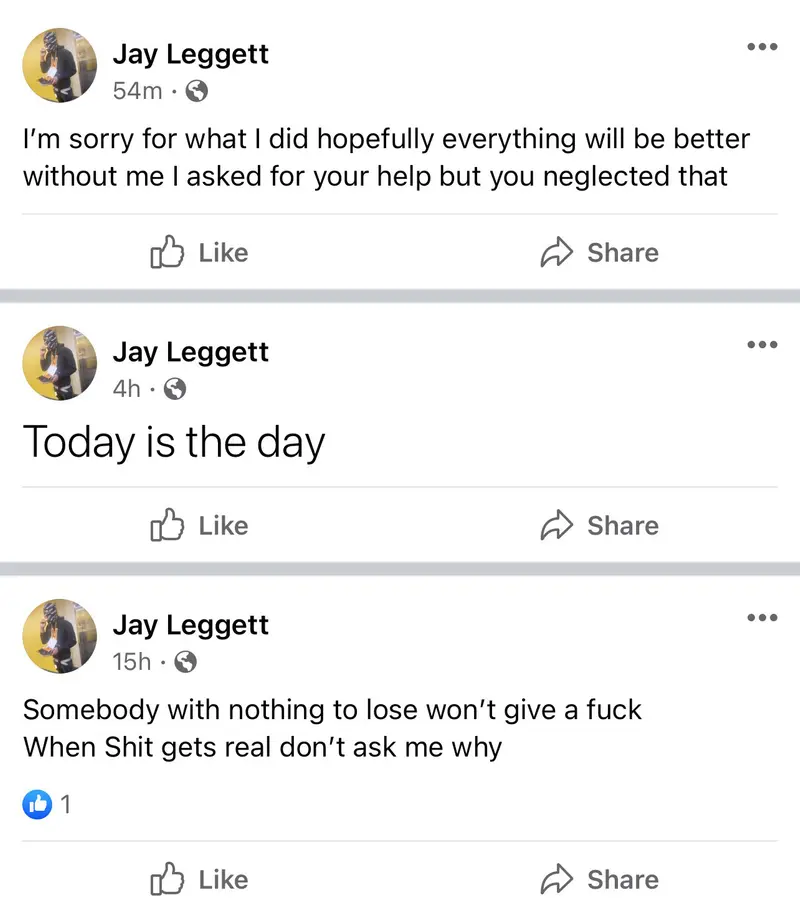
Federal and state laws should have protected Carter by preventing Leggett, who had a felony record, from having a gun. And Carter had an extra safeguard: an order of protection against Leggett. That meant he was barred from contacting her, coming near her or having a firearm. According to the law, if he violated the order, he would be arrested.
But weak oversight of gun laws allowed him to get a weapon. And when the officers arrived, they said they didn’t have enough evidence to prove that Leggett had violated the order.
The officers escorted Carter and her mother home. Carter had packed a go-bag, and she wanted to get her ID and the paper copy of her protection order. One of the officers, who was still in training, did a sweep of the yard.
According to Carter’s family, the officers suggested that if she saw Leggett with a gun, she should try to take his photo.
Then the police left.
Ten minutes later, according to police records, Leggett busted down the door and shot Carter.
The Metropolitan Nashville Police Department declined to comment because of a pending lawsuit filed against it by Carter’s family. An internal investigation found the officers broke department protocols for domestic violence cases.
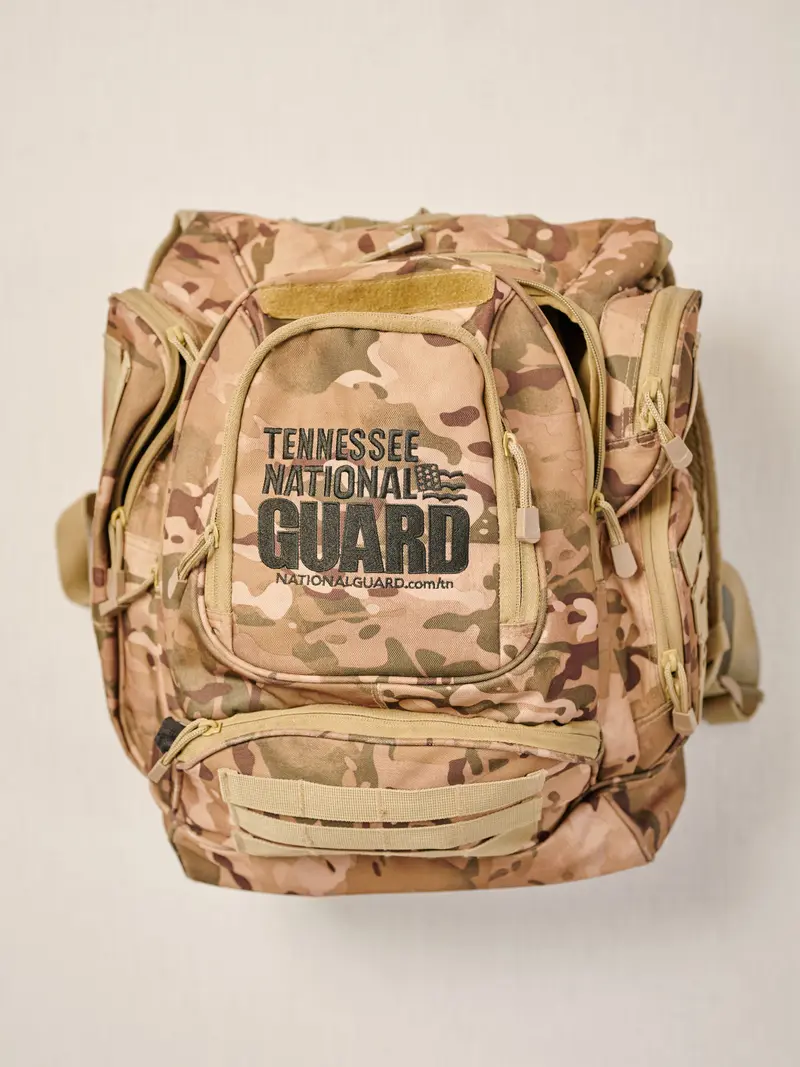
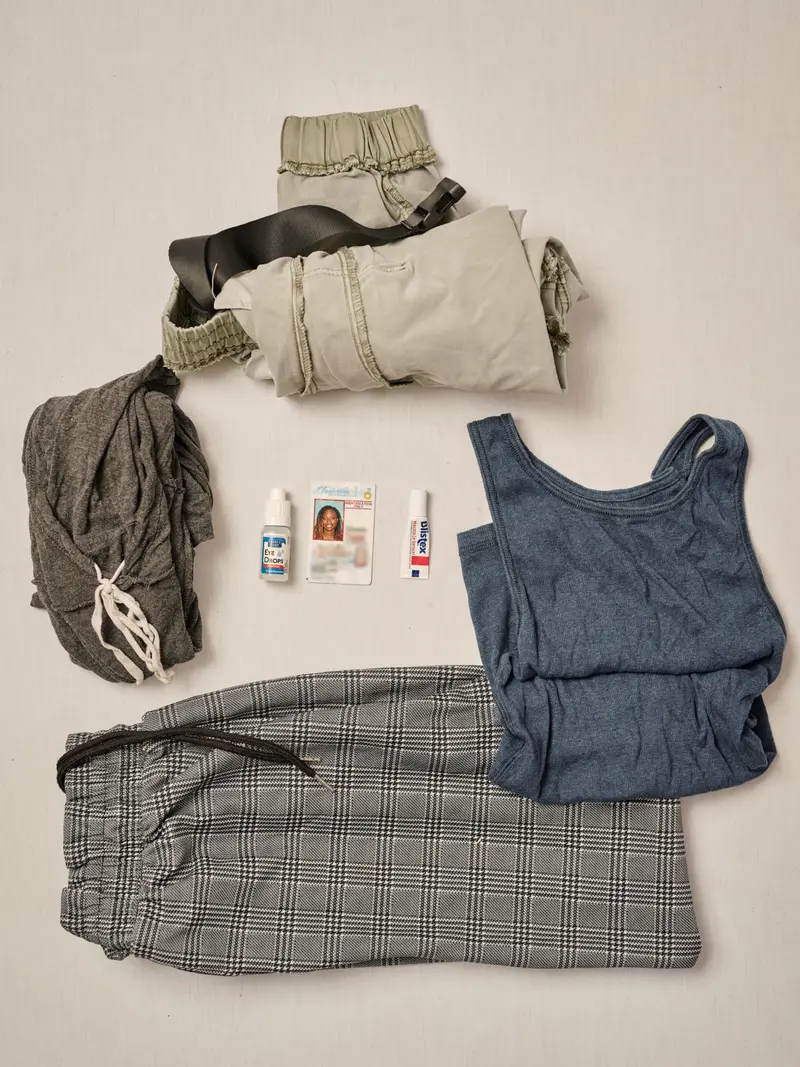
While the botched police response received local media attention at the time, what hasn’t been reported is that it was only the final mistake of a criminal and civil justice system in Tennessee that has repeatedly failed to stop dangerous people from accessing guns.
In fact, what was remarkable about Carter’s shooting was not that it was atypical, but just how common it was.
Carter was one of at least 75 people killed in domestic violence shootings in Nashville since 2007, when the police switched to a searchable record system. Of those, at least 29 victims — nearly 40% — were shot by people who were legally barred from having a gun, according to a WPLN and ProPublica analysis of court records in Davidson County, where Nashville is located.
One of the youngest victims was 5 years old while the oldest was in his 70s. Some were shot during heated arguments. Others were killed while playing in the snow.
The problem of how, or even whether, to separate dangerous people from their guns is now front and center on the state and national agenda. Next week, legislators will gather for a special session on public safety in response to a Nashville school shooting in March that claimed the lives of three young children and three school staffers. And this fall, the U.S. Supreme Court will hear arguments in a case on whether it’s constitutional to bar people subject to domestic violence orders from possessing guns.
There’s a lot at stake in Tennessee, which consistently ranks in the top 10 states in the rate of women killed by men. As in most states, Tennesseans convicted of certain types of felonies and domestic violence misdemeanors or who are juveniles or subject to protection orders are explicitly prohibited from possessing guns.
But while other states have policies to get people to turn over their weapons, Tennessee’s laws offer few mechanisms to retrieve guns after someone has been barred from having them.
Law enforcement rarely goes to someone’s home to make sure they don’t have a firearm, unless an incident prompts them to. And at protection order hearings, judges seldom ask follow-up questions about weapons like: “How many guns do you have? Where are they kept?” Or even, “Who are you going to give them to, now that you’ve been ordered to relinquish them?”
That last question is part of a dangerous loophole in Tennessee called third-party dispossession. In some states, when people are ordered to give up their guns, they have to give them to law enforcement or a licensed firearms dealer. However, in about a dozen states including Tennessee, they can also give guns to a friend or a relative.

Tennessee doesn’t require the third party to even be identified on the firearms dispossession affidavit. There are also no guardrails to ensure that those third parties aren’t themselves also prohibited from having guns or to punish them if they give guns back to the owners.
In response to the March school shooting, Republican Gov. Bill Lee has proposed expanding those dispossession laws to people with mental illnesses who are deemed a threat to themselves or others. It would essentially be an expansion of the system that is failing victims of domestic violence by allowing guns to slip through the cracks.
But even the smallest of reforms might be in doubt: Time and again, the conservative Tennessee Legislature has not only refused to pass tougher gun laws but loosened restrictions, making it easier for people to buy and carry guns.
An Easily Accessible Gun
Carter met Leggett about a decade ago when they were both in high school. She excelled at track and liked to read and to write in her journal. One day, she wrote, she walked into class, and Leggett couldn’t take his eyes off her. Carter had the kind of smile that lit up her whole face, even the whole room, her mom said. Leggett and Carter started dating, and from the outside, they seemed like a happy couple — always laughing and dancing together.
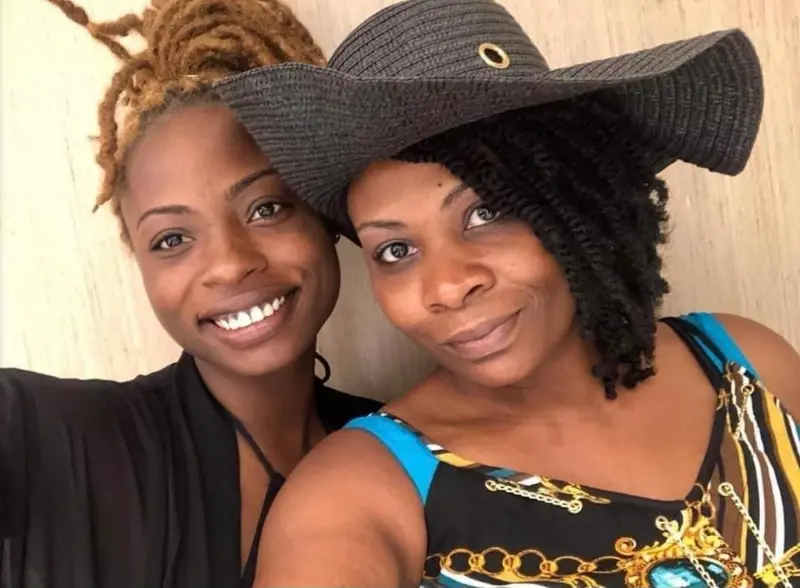
But they drifted apart when Leggett ran into trouble with the law and spent time in and out of jail. His criminal record has several felony convictions from 2013 and 2017 for robbery, burglary and drug possession — convictions that barred him from having a gun.
WPLN and ProPublica requested an interview with Leggett through his lawyer and by sending him a letter in prison. But the letter was never answered, and Leggett’s lawyer said his client declined to comment. Leggett was charged with first-degree murder. He has not yet entered a plea and is set to appear in court in September.
Despite Leggett’s history and occasional probation violations, Carter always held out hope that he might change, her family said.
Carter and Leggett were back together but living separately in April 2020 when police were sent to his parents’ house for a domestic assault — but not one involving Carter.
Marvin and Elizabeth Leggett were both 60 years old and lived in a two-story house with a brick facade in Antioch, a neighborhood in southeast Nashville. According to a police report, they were trying to kick their son out and gather his belongings when he turned violent, pushing his mother to the ground, then throwing his father against the wall.
When Elizabeth Leggett approached him, the police report says, he grabbed his dad’s revolver and pointed it at her.
“Get back, bitch,” he said coolly.
Then he fled, taking the gun with him.
Marvin and Elizabeth Leggett told law enforcement they wanted to press charges. But the charges were later dismissed by a judge in August 2021 when they didn’t show up to court. The Leggetts declined to comment for this story.
Marvin Leggett also decided not to report his gun as stolen. But thanks to the initial charges, the police, courts and probation office all had access to information that a gun was easily available to Leggett and that he had been accused of threatening people with it.
It’s unclear if Leggett returned the weapon to his father. But according to the police, it was the same gun he would use to kill Carter.
“This Person Is Dangerous”
Of the people charged with domestic violence homicides who were barred from having a weapon, most were prohibited by state law because of a prior felony conviction. Those ranged from drug charges to homicide. In some cases, the person had already been charged once with unlawful possession of a gun.
But despite being barred for a felony, the law doesn’t spell out how to ensure the person doesn’t have guns. Often, it’s discretionary if law enforcement pursues a search warrant to retrieve someone’s gun, said Jenny Charles, an assistant district attorney in Nashville with nearly two decades of experience on domestic violence cases.
“There have been a lot of cases where I feel like I’m on a mountain screaming: ‘This person is dangerous. This person is dangerous,’” she said. “But without the person being on probation or under an order of protection, there’s just very little we can do.”
Because the state’s probation office is required to monitor people after they leave prison, it often has the best chance of catching people if they illegally have a gun. The probation office declined to comment on what it knew about Leggett’s access to guns or what it did to check on him.
But it said its officers explicitly tell offenders during intake that they can’t have access to weapons and ask others in the home to remove or secure weapons. They also ask about weapons during home visits and routinely do searches for them, the agency said.
Tennessee’s other gun laws have also made it more difficult for law enforcement and the courts to track illegal gun ownership, Charles said. Tennessee, like more than half of the United States, allows private sales without background checks, which opens the door for people prohibited from buying firearms to purchase them anyway. In addition, the state does not require a permit to carry and is one of only eight states that prohibit the creation of a gun registry entirely.
As a result, even after a crime is committed with a gun, it’s rare to have a full understanding of where that weapon came from.
“If I Stay, I’m Going to Die”
While there are gaps in enforcement when it comes to felony gun prohibitions, Carter also had a safeguard many other victims didn’t have — a protection order, which she got after a brutal beating in July 2021, four months before the shooting.
KiAndrea Jones remembers her little sister coming around the corner with her head hung low, her long dreads falling over her face. The only illumination was from a nearby streetlight.
When she came closer, Jones gasped.
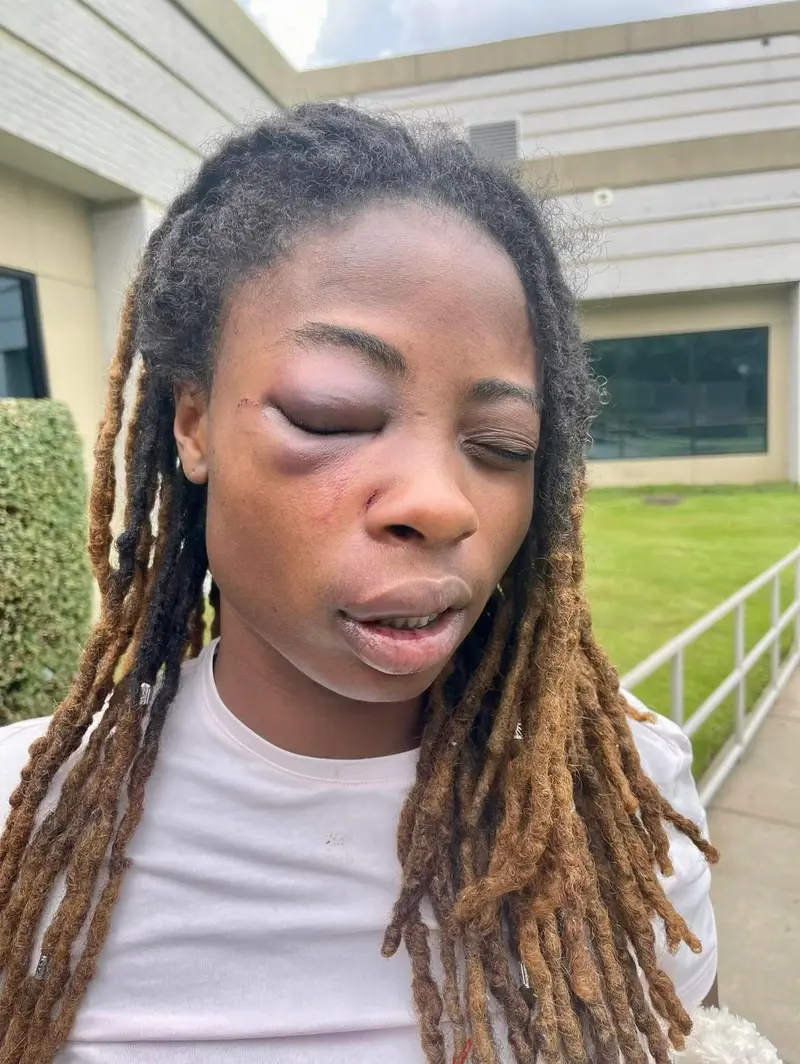
Half of Carter’s face was swollen beyond recognition. Leggett had hit her in the face multiple times with a glass bottle of Jack Daniel’s, according to criminal court records.
Jones pulled her sister into her arms.
“You don’t have to be scared,” she told her. “I’m not going to ever let him hurt you again.”
Earlier that night, Carter’s family had thrown Leggett a surprise 27th birthday party. Afterward, some of them had gone to Lower Broadway, Nashville’s tourist strip of bars and honky tonks.
There, Jones said, she noticed Carter and Leggett arguing.
She said it was like Jekyll and Hyde: One side of Leggett was charming, the life of the party. But this other side of him was angry and controlling.
“His whole demeanor just changed,” she said. “Like, I’d never seen him the way that I seen him that night.”
But it turned out that night wasn’t the first time he’d lashed out. As Carter sat in a hospital bed early the next morning with her battered face, her family listened as she recounted the history of violence to a police officer.
She told them that since they eloped in December 2020 and moved in together, Leggett had become controlling. He would listen in on her phone calls, read her text messages and take her phone away to isolate her. He tried to convince her that her family didn’t really love her, she told the police. He started abusing drugs again and cheating on her. She had tried to leave him a few months earlier, she said, but he beat her up until she wasn’t able to walk.
Carter told her family that the abuse had gotten so bad that she had tried to kill herself by overdosing. She said she felt that the only way out of her relationship with Leggett would be if one of them were dead.
As she recounted the horrors, it was clear to her family that she had hit her breaking point. She was ready to leave him.
“She looked at it like: ‘If I stay, I’m going to die. And if I leave, I’m taking a chance,’” her mom said. “And she took that chance.”
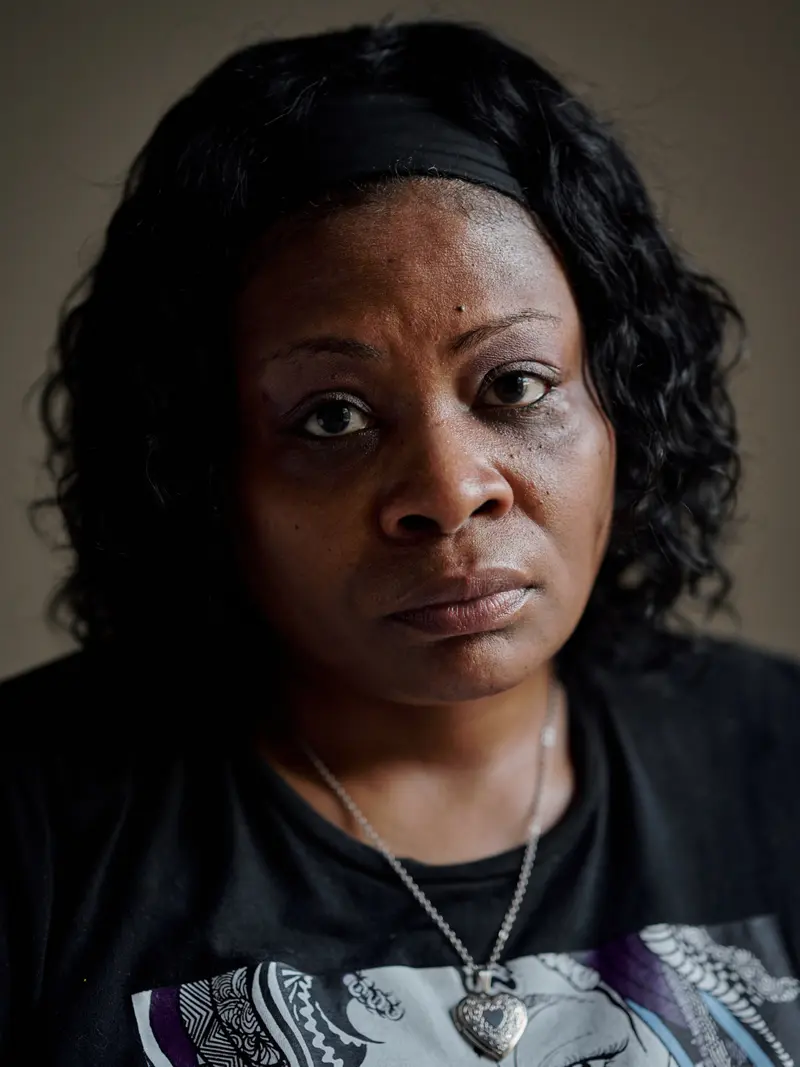

She told police she wanted to press charges against Leggett. And after leaving the hospital in the morning, Carter petitioned the court for a protection order against him.
Leggett was arrested. But the assault charges were dismissed less than two weeks later. Right before a hearing, Carter found out that she’d have to face him in court. She had a panic attack and left the courthouse. While the family said they had communicated her fear to the district attorney’s office, prosecutors said they could only go forward if she identified him in court.
Though the charges were dropped, Leggett remained behind bars for violating his probation. And in August, Carter’s protection order was granted. A judge ordered Leggett to stay away from Carter when he got out of jail, and he was barred from having a gun.
Yet after exhausting legal options to protect herself, Carter still didn’t feel safe.
“She was holding up the paper that they gave her,” Jones said she remembered from the day the protection order was granted. “And she was saying: ‘This is just paper. This is just a piece of paper. He can shoot me through this piece of paper.’”

“The System Failed”
On paper, protection orders are considered one of the most powerful tools for domestic violence victims. If someone violates the terms, they can be arrested and held for at least 12 hours, separating them from their victims. They also require people subject to them to turn over their firearms to someone else within 48 hours and to file declaration forms in court listing the make, model, caliber and serial numbers of the guns they relinquished.
But there are problems with Tennessee’s system: Protection orders can be hard for domestic violence victims to get. They aren’t always enforced. And people subject to them can simply turn their firearms over to a friend or relative, leaving them with easy access to their guns. There isn’t even a space on the gun dispossession form for the name of the person holding the weapons.
WPLN and ProPublica found that of the approximately 75 domestic violence homicides, only three cases had an active order of protection at the time of the shooting.
At least three other people had protection orders filed against them leading up to the incident, but the orders were dismissed after the court had trouble reaching the victim.
“If the petitioner is going into a shelter, they might be harder to reach,” said Becky Bullard of Nashville’s Office of Family Safety.
Sometimes protection order hearings can be delayed for months, she said, even though the statute indicates they should be held within 15 days. “We’re giving the respondents a lot of time to ramp up their violence and to potentially coerce the petitioner not to come to court,” she said.
And occasionally, Bullard said, victims choose not to pursue an order of protection at all out of fear that it might enrage their abuser and escalate the violence. WPLN and ProPublica found that in some cases just a few months passed between the petition for a protection order and the homicide.
For 30-year-old Temptress Peebles, that window was just one week. She asked for an order of protection on Oct. 10, 2019. By Oct. 17, 2019, she was dead.

“The system failed my child terribly,” said her mother, Karen Peebles, who described her daughter as free-spirited and outgoing, with a high and lilting voice, which earned her the nickname Chippie. “They didn’t respond like they should have, which I think cost my daughter her life.”
According to court records, the order was the third she had sought against her ex-boyfriend, Brandon Horton, in the year leading up to her death.
In January 2019, she told the court, Horton threatened to kill her rather than see her date someone else. Six months later, she reported, he burst through her back door with a gun and pointed it at her.
Her final petition for a protection order includes a statement from Peebles that is especially prescient.
“Brandon has threatened to kill me before,” she wrote in the document. “He once said to me, ‘Since you put all that warrants on me, before they catch me, I am going to kill you.’”
“I am terrified that Brandon is going to kill me,” she wrote.
A week later, police said, he did — in front of her 8-year-old daughter — with a gun he wasn’t supposed to have.
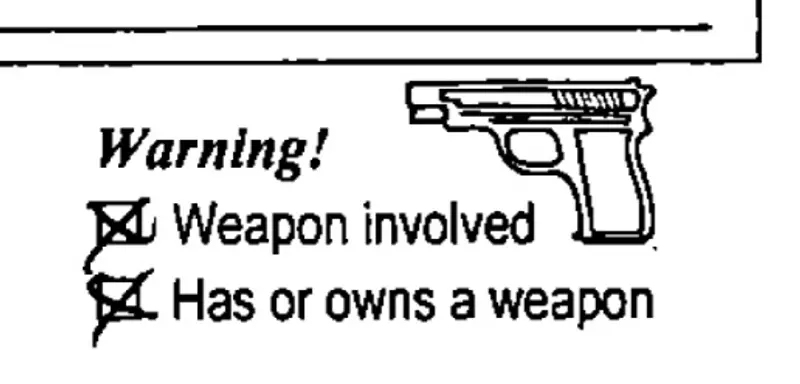
WPLN and ProPublica contacted Horton through his lawyer and by writing a letter to him in prison, but his lawyer said he declined to comment. He was charged with first-degree murder. He has not yet entered a plea, and his trial is forthcoming.
“Help Me”
A little over three months after Carter got her protection order, her fears that it was no more than a piece of paper came true.
Shortly after the police left her house on Nov. 15, 2021, she ran outside to get in her friend’s car. She had stuffed clothing, a toothbrush and her protection order into her green camouflage backpack and planned to get as far away from home as possible.
But when she looked down the street, her family said, she realized it was too late. Leggett was walking quickly toward the house with a gun in his hand, his face set in angry determination.
She ran back into the house, yelling: “Mama, mama! He’s here! He’s here!”

Jones-Mbuyi went to the window with her phone in her hand. She tried to take a photo of Leggett like the police had asked. But she was shaking too hard. Her phone kept falling to the floor.
Carter called 911. The two women ran into the bedroom and locked the door.
When the dispatcher answered, Carter spoke in a low, urgent whisper.
“He’s here, he’s here,” she said. “The police just left, but he’s here.”
The dispatcher started asking questions: How do you spell his name? How old is he? What does he look like?
One minute into the call, Carter asked: “Are you sending somebody? Did you already send somebody?”
The dispatcher didn’t answer. Instead, she kept asking questions.
Two minutes into the call, Carter pleaded, “Can you just send somebody?”
“I have to ask these questions for police safety,” the dispatcher snapped back.
“Did you already send a squad car or not?” Carter asked again. “Why are you not answering me?” Jones-Mbuyi took the phone.
Three minutes into the call, and the dispatcher was still asking questions: Has anyone been drinking? Is he by himself? What was that address again?
But before they were able to answer, Jones-Mbuyi said, “He just bust the door down.”
There’s a loud boom — the noise of her bedroom door being knocked off the hinges.
Then, a scream. The sharp pops of gun fire.
“Michaela, what’s happening?” the dispatcher asked.
“He just shot her,” Jones-Mbuyi cried out.
In the background, Carter screamed in agony. She was shot twice — once in the chest and again in the leg. She fell face down onto the floor.
Four minutes into the call, Jones-Mbuyi was overtaken by the horror in front of her. She screamed. It was guttural. Heart-wrenching.
“Send an ambulance, send an ambulance!” she shouted into the phone.
Five minutes into the call, the dispatcher confirmed that an ambulance was on its way.
Carter’s screams turned into labored moans.
“Ambulance,” she slurred.
Ten minutes into the call, the paramedic arrived.
“Are you still able to breathe?” he asked her.
“Barely,” she choked out.
“Help me,” she said. “It’s getting hard — it’s getting hard to breathe.”
Then, the call ended.
A few days later, Carter died of her injuries at the hospital. She was just hours away from turning 25.
“Life has been stagnant — so I feel like every day is Nov. 15, 2021,” said Jones, her sister. “It’s hard to heal and move past something when we have been failed so many times. And now we have to fight. Not just for Michaela, but for other women in her situation.”
